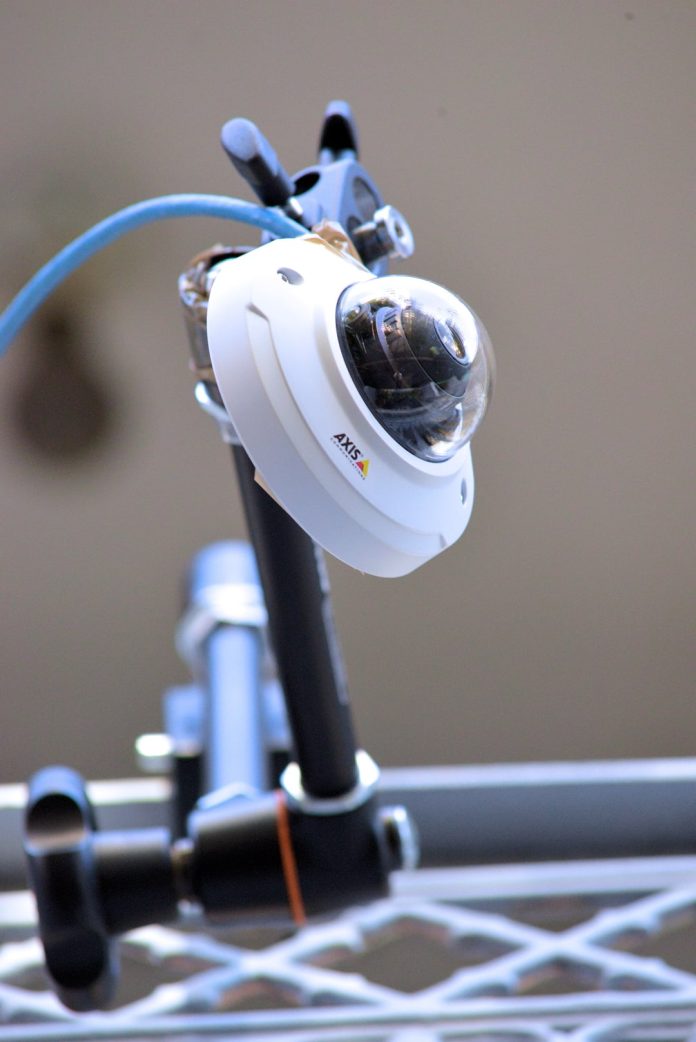New from Axis is the PoE 1080p M3045-V dome with HDMI and a highly flexible pan and tilt gimbal. This 1/3-inch progressive scan CMOS camera features a fixed 2.8m F2 lens, giving a wide 106-degree field of view and light sensitivity down to 0.25 lux.
TRULY compact dome cameras face a tough task. Within their compact housings they’re required to offer broad and at times conflicting functionalities, including compact size yet quality optics and very wide field of view yet low distortion and high image sharpness. Adding pressure to the recipe is the demand for low price. Clearly, this class of camera is a compromise and what installers and end users want to know is whether or not the balance of compromise meets their requirements.
Before we look at performance in the field, let’s run through the specifications of the M3045–V. They include a ubiquitous 1/3-inch progressive scan RGB CMOS sensor with a resolution of 2MP and a fixed iris, fixed focus 2.8mm F2 lens with a magnesium fluoride coating and a horizontal field of view of 106-degrees along with a vertical field of view of 59-degrees, making the camera capable of being mounted high.
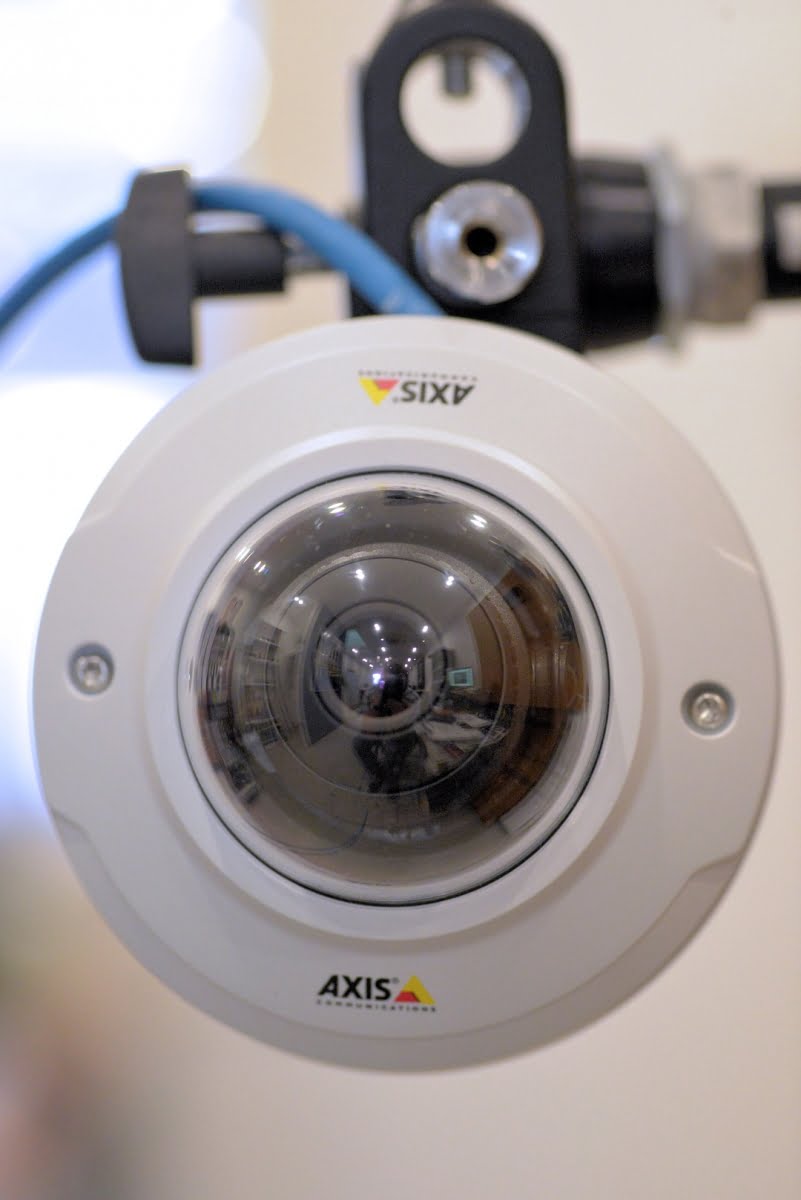
Befitting its internal specification, the camera has a minimum scene illumination of 0.25 lux and a selectable shutter speed between 1/32500 s and 1/5 s. The adjustable gimbal pans 177 degrees and tilts 69 degrees and the mount rotates 176 degrees. Resolution is 1080p, there’s WDR functionality, Zipstream compression technology, digital PTZ and multi-view streaming, HDMI output for live streaming to a local monitor, there’s H.264 (MPEG-4 Part 10/AVC), Main, Baseline and High Profiles, and MJPEG compression.
Selectable resolutions range from 1920 x 1080 pixels to 320 x 240 pixels, there’s Zipstream technology in H.264, VBR/MBR H.264, up to 2 individually cropped out view areas in full frame rate and digital PTZ. Camera settings within the Axis camera browser include compression, colour, brightness, sharpness, contrast, white balance, exposure control, backlight compensation, WDR, Text and image overlay, mirroring of images, privacy mask and rotations of 0, 90, 180 and 270 degrees, including Corridor Format.
You can use the digital PTZ capabilities and multi-view streaming to view separate video streams of zoomed-in sections of an image at the same time as you view the full overview image. In the hand this is a compact unit that’s only 56mm high and 101mm in diameter and weight is just 170g – the M-Series really is compact. The white PVC-free poly housing (which can be painted) and smoked dome are well made. The camera has encapsulated electronics making it IP42 water and dust resistant and there’s IK08 vandal resistance as well as Torx 10 captive screws. Operating temp is 0-45C and maximum humidity is 85 per cent. These numbers are fine for indoor applications.
Power draw is 2.6W average with a maximum of 3W and there are RJ-45 and an HDMI Type D connectors. The camera supports microSD/microSDHC/microSDXC cards with a capacity up to 64GB,VMS options include free AXIS Camera Companion, AXIS Camera Station, and video management software from Axis’ Application Development.
The camera is can share event footage via file upload to FTP, SFTP, HTTP, HTTPS network share and by email and notification of events can be sent via email, HTTP, HTTPS and TCP and SNMP trap. The camera supports event triggers analytics and edge storage events and video can be recorded to the edge and video clips sent with pre-alarm and post-alarm video buffering.
Camera performance
The compact nature of the camera, the smoked dome, the fixed focus and the short focal length giving a wide angle of view with a relatively compact CMOS sensor mean the performance characteristics of the M3045-V are generalist with a specific focus on internal applications. First impressions inside and outside suggest the camera system doesn’t meet the standards of some of Axis’ higher specified day/night domes and full body cameras but within the constraints of its specification, the M3045-V does well.
Depth of field is a strength and WDR performance is good, too – especially at close ranges. Resistance to motion blur is good for pedestrians but I can’t get plates at traffic speed in good light. Low light capability – remember this is not a D/N camera – isn’t bad, either. Low light performance is subject to blooming and noise that starts to build from about 25 lux. Noise and noise reduction artefacts are quite noticeable at 5 lux but the camera stays in colour. Same as every IP camera, as light levels fall, motion blur becomes an issue and there’s a point at which court admissible face recognition is impossible.
A contributing factor to overall performance is the wide angle of view and the small sensor, which spread pixels and leads to diminishing returns with digital zooming. For internal applications with modest distances, this works fine and it was noticeable testing outside that the camera was capable of face ID to about 12m, which is pretty good going at a 2.8mm focal length. This camera is going to find a home in retail outlets, service stations and shopping centres so faces at long distances aren’t the priority.
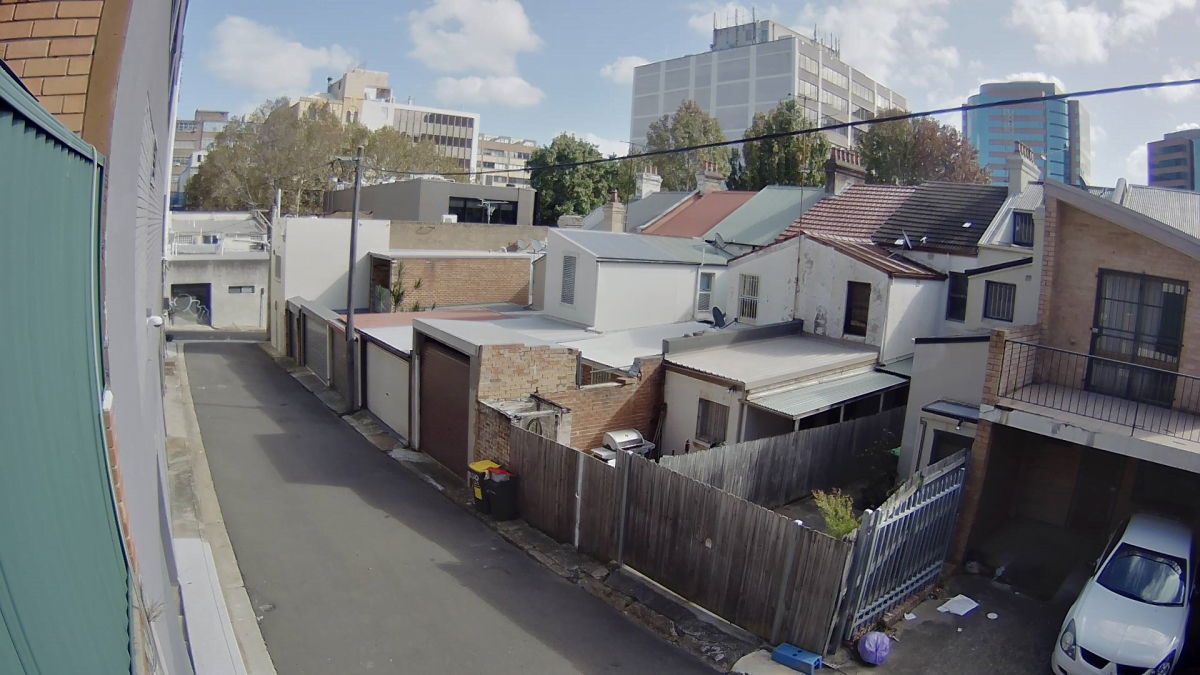
In the rear lane with full sun at an oblique angle the image was relatively strong and enormously wide – there’s a lot of detail with a 2.8mm focal length and I was able to take advantage of the 59-degree vertical coverage to get right down close to the foot of the camera mounting point. I noticed one consistent very mild ghost in strong light, which looked to be a reflection of the red lens coating off the dome bubble but it did not have any real impact on the image quality. Faced with movement, including cars and tree branches, there is some stepping in the image stream.
I noticed barrel distortion and guessed it was around 9-10 per cent. This camera doesn’t show much in the way of chromatic aberration, which is great given the very wide lens and 1080p bandwidth. When your camera is undertaking a delicate balancing act, you don’t want to be giving up detail to purple fringing. Intrusive tone mapping was all but invisible in good light and not much in evidence in low light either, where its symptoms merge with falling shutter speeds.
Colour rendition is strong and performance across the scene is very consistent – there’s none of the pockets of deep shadow you often see. I also found that activating WDR did not lead to loss of contrast and sharpness in the image as it so often does. This is a camera you can run with WDR on auto without fearing there will be times when a customer will pay a price for your decision.
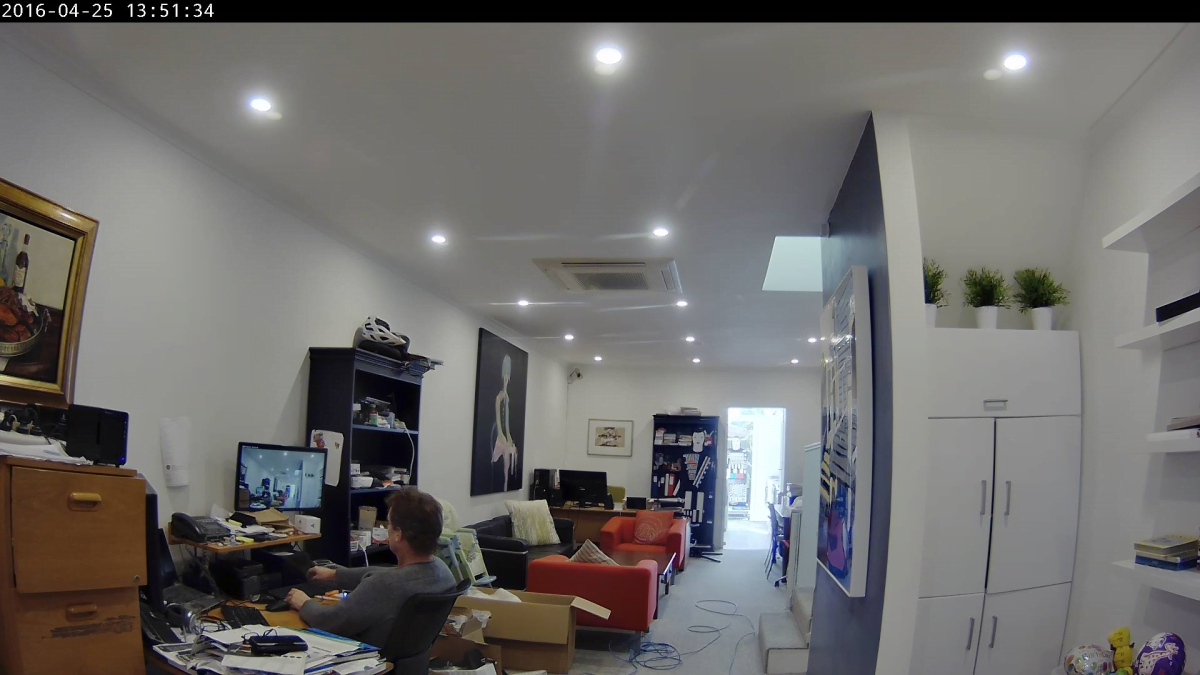
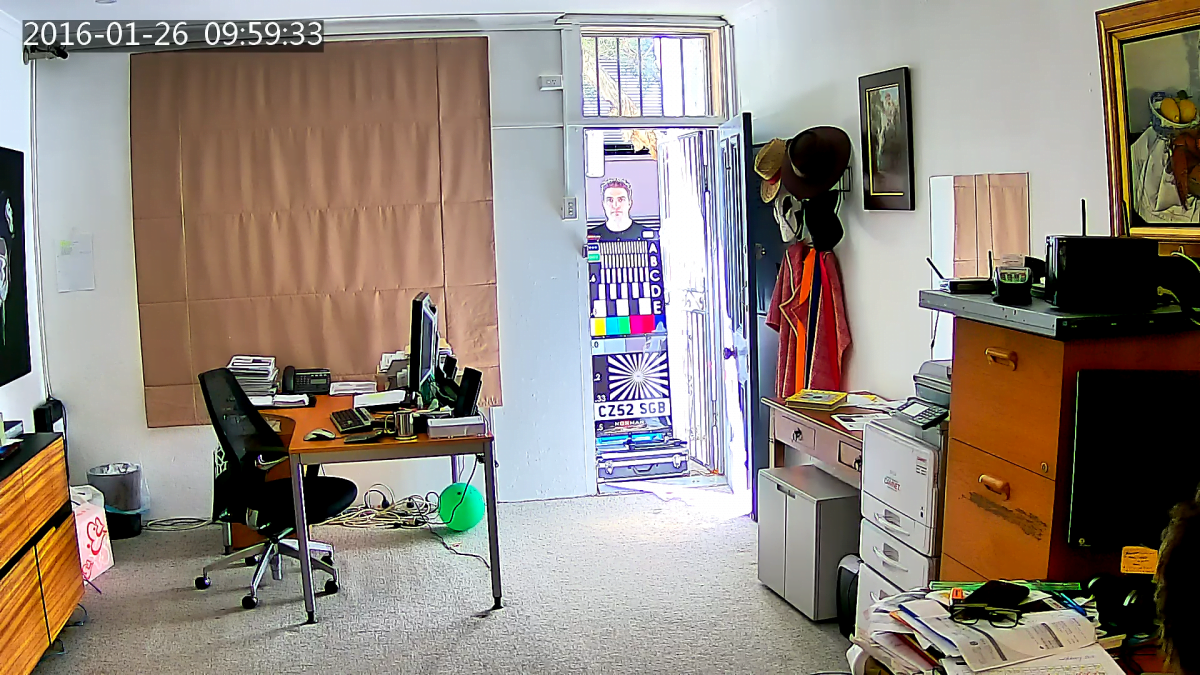
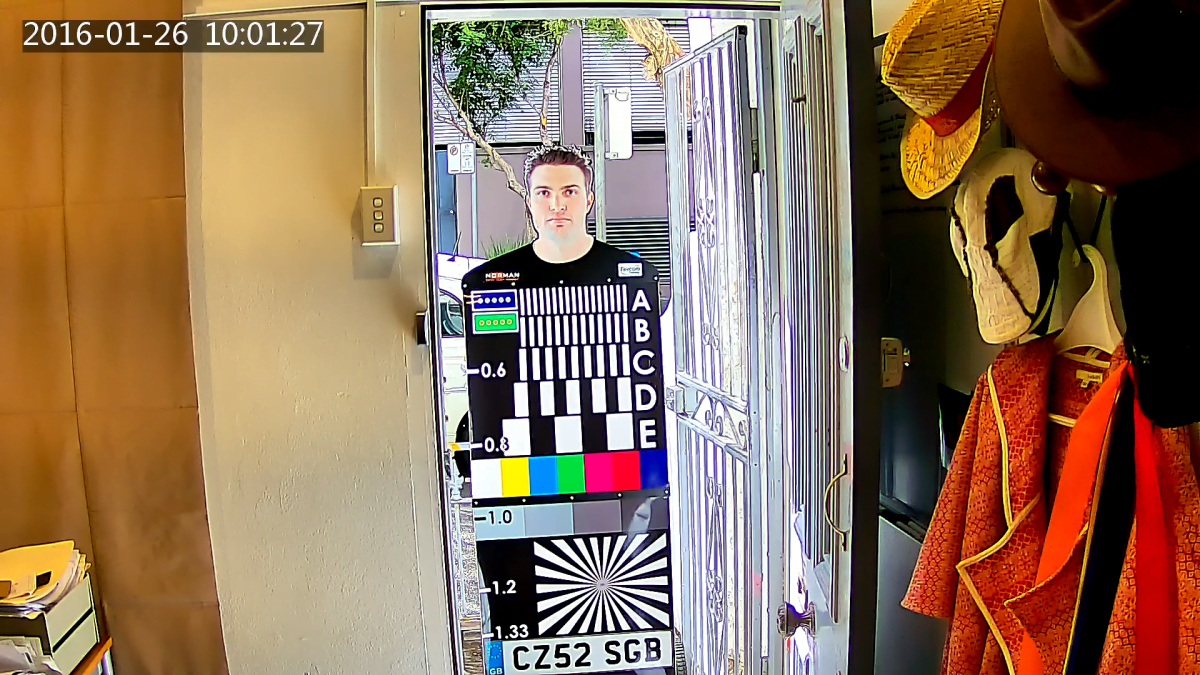
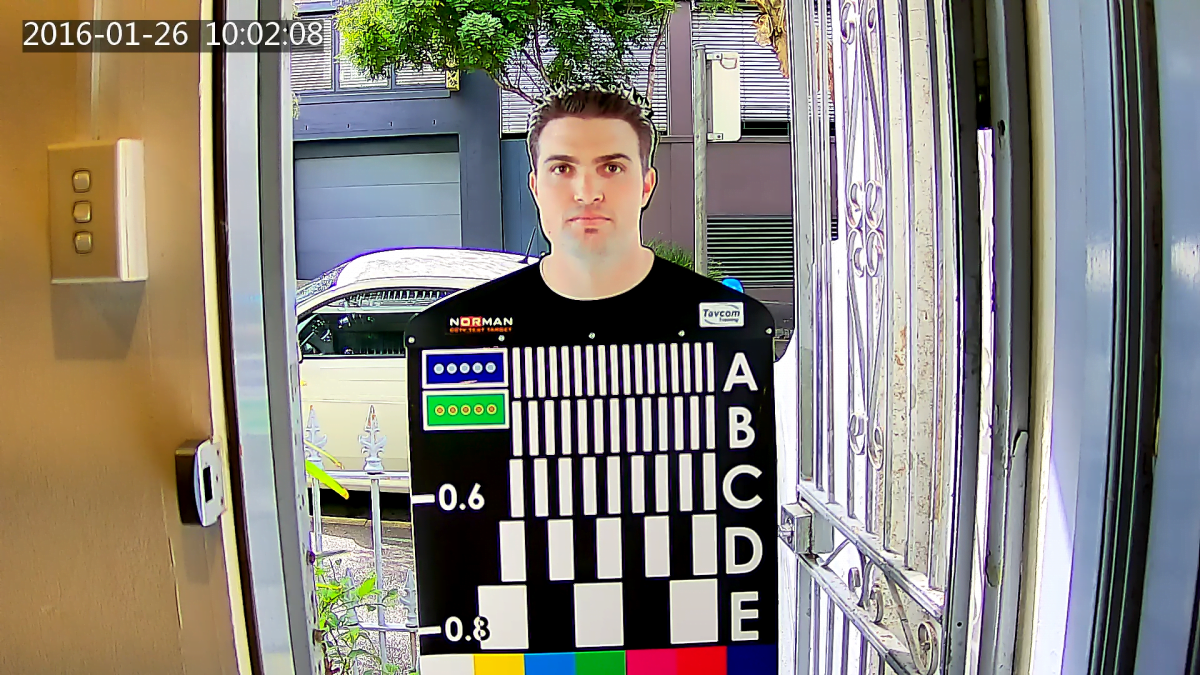
You can see the strong sidelight/backlight is throwing up some CAs here but they’re only provoked in extremis.
Against 78,000 lux of backlight, the M3045-V did less well when almost all 16m of the office was between the lens and Norman’s face – under these conditions there was blooming around Norman’s head. Up close, things improved – this is quite normal – and at 2m, the camera was doing as well as many much more expensive units, despite its huge angle of view.
Going out the front in good light, the camera does well in our street test, showing good detail of Norman at 8m, reasonable detail at 12m and reduced detail at 16m, where pixel spread really leans in. Because of this factor, I didn’t take Norman out past 16m – the camera is not designed to give high levels of detail past this point, though I do notice depth of field is surprisingly strong from the point of view of situational awareness in full screen. Colour rendition is a real strength, as you can see in the images below.
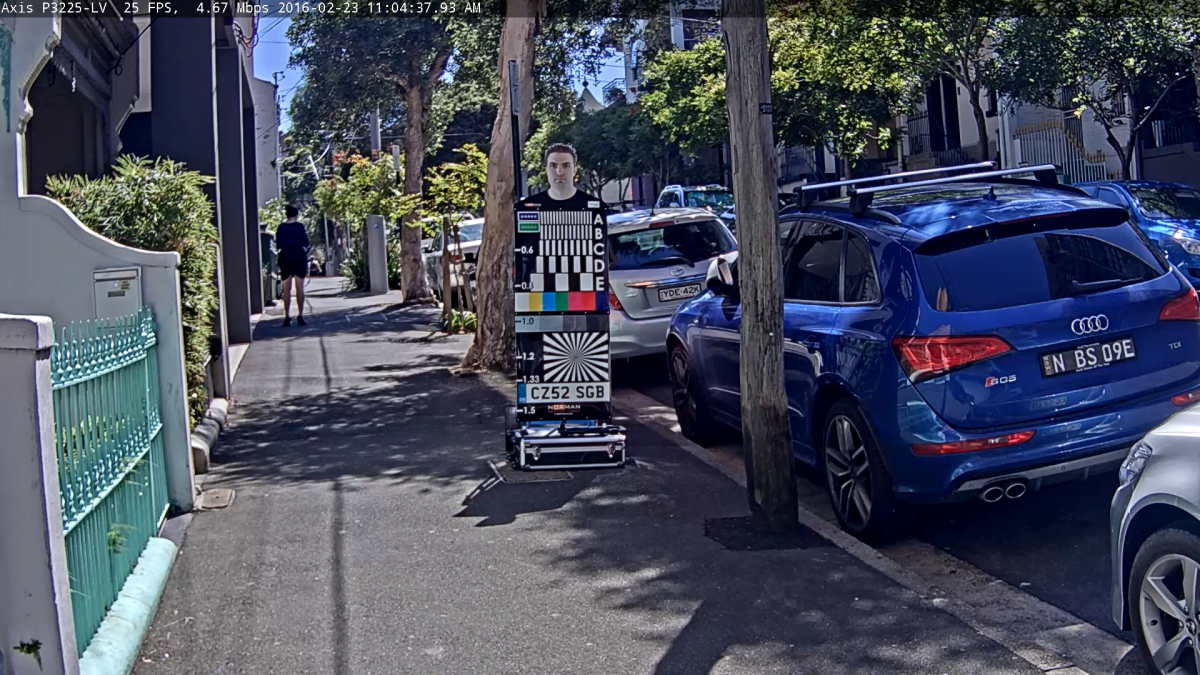
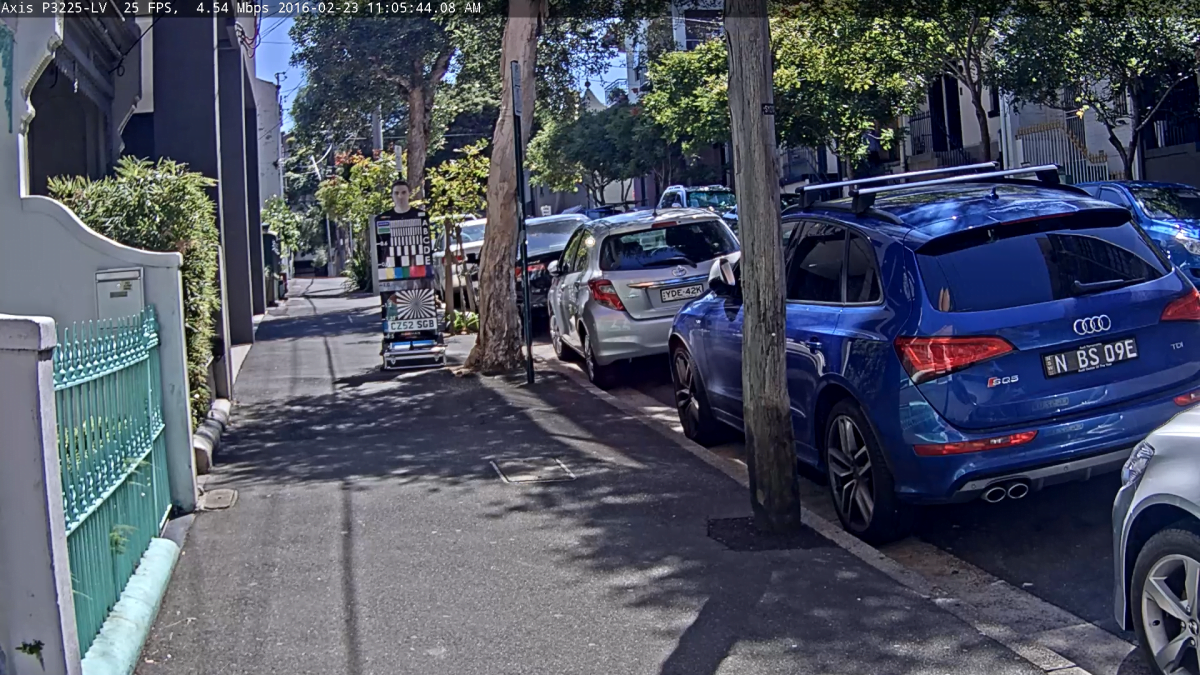
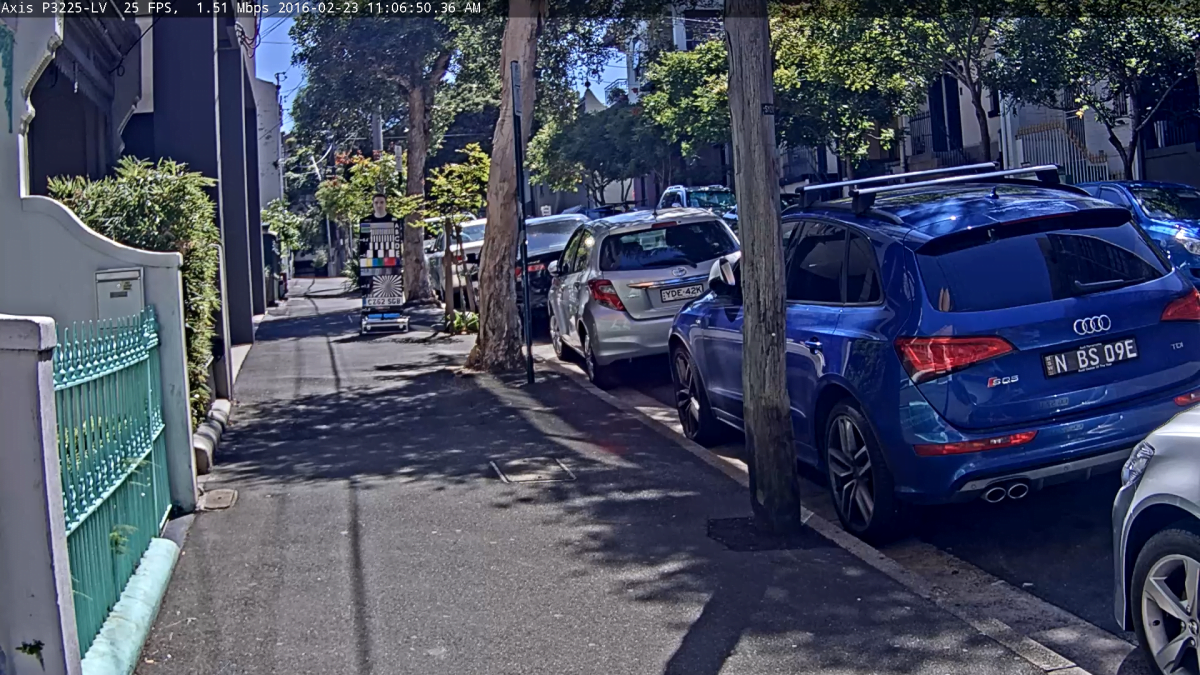
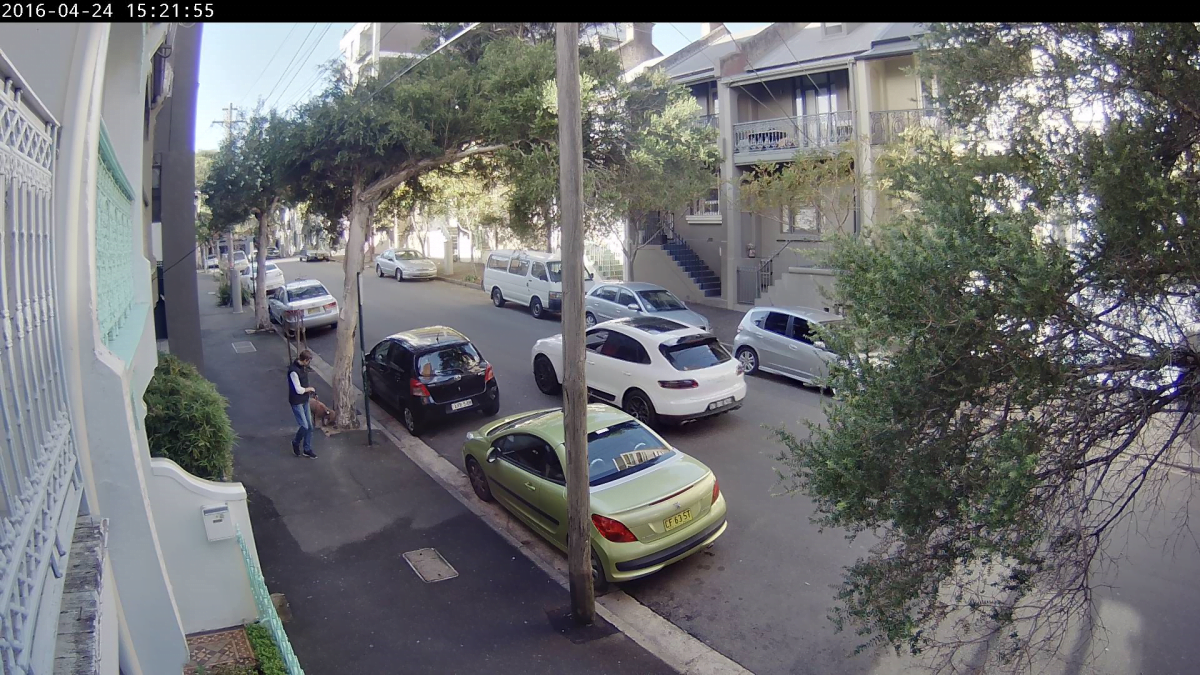
No LPR in good light…
As night comes on, noise levels increase and the image stream softens but the camera stays in colour. There’s an increase in blur but that’s to be expected at this specification. I give Ronnie Rotakin a run out the front and yes, there’s noticeable increased blur with movement thanks to the slower shutter speed.
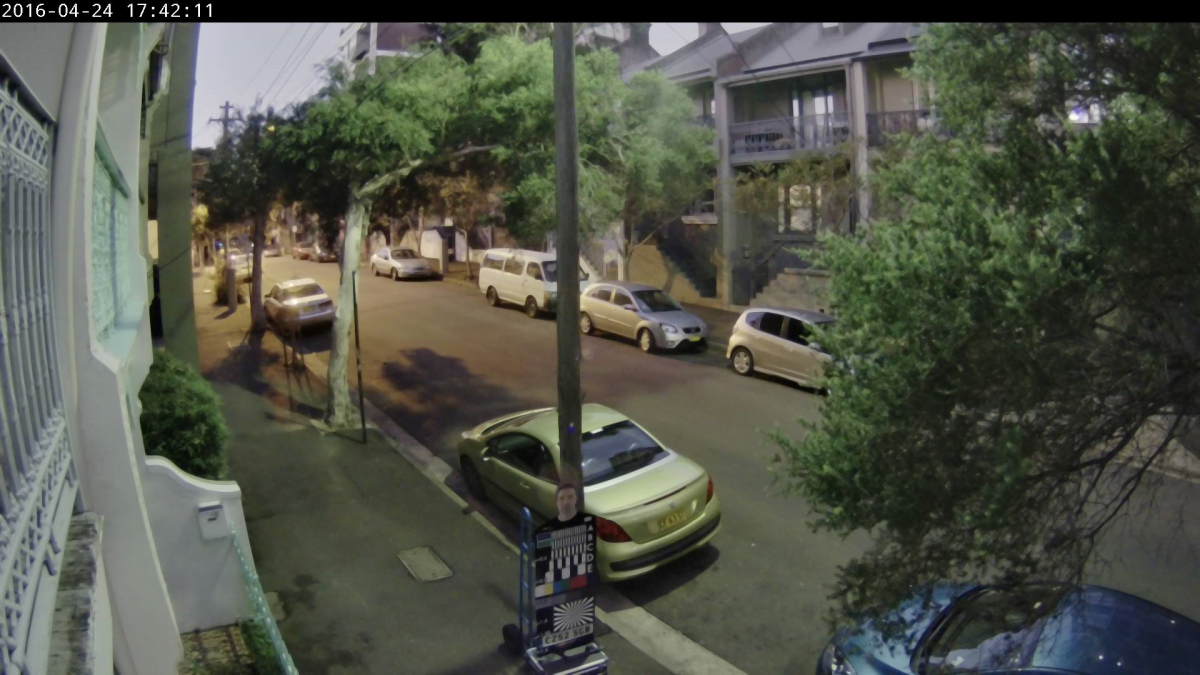
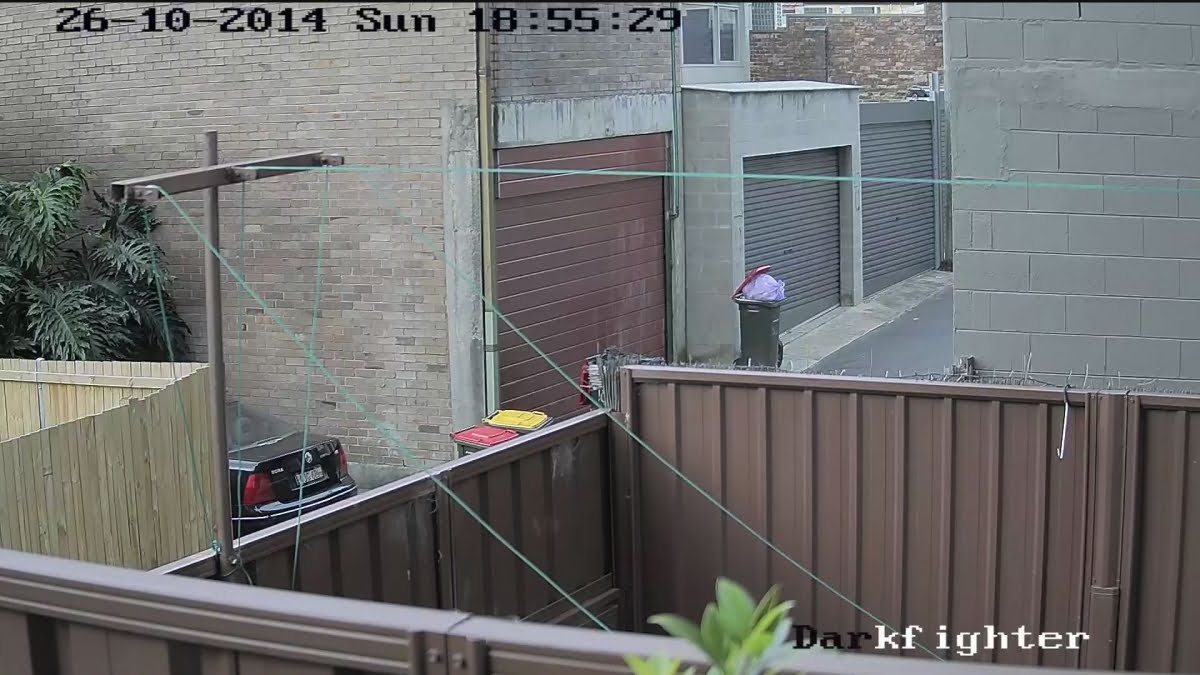
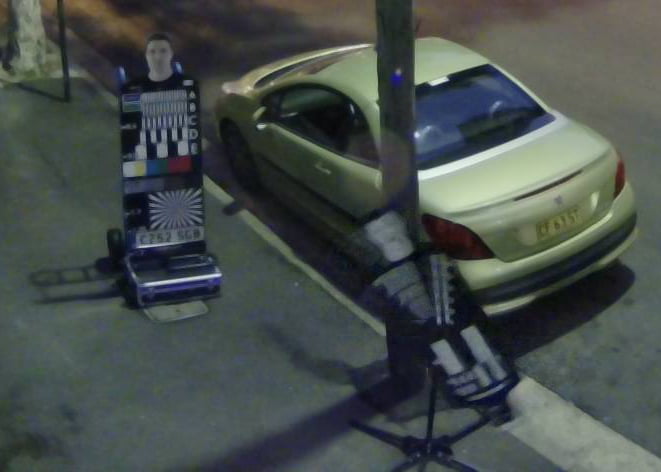
Overall, the M3045-V is a capable compact dome that offers users an affordable, yet well-optioned camera, with plenty of functionality. The angle of view is substantial, there’s comparatively low levels of distortion, low CAs, the WDR performance is much better than expected, Zipstream assures miniscule bitrates, and the footprint really is discreet – you’re not paying for a big housing containing a large volume of air. ♦
By John Adams
Features of the Axis M3045-V include:
* Ultra-compact, vandal and dust-resistant design
* HDTV 1080p/2 MP
* HDMI support enables streaming to a monitor
* Axis Zipstream technology reduces bandwidth and storage
* Axis Corridor Format
* Horizontal field of view: 106 degrees, vertical 59 degrees
* Light sensitivity 0.25 lux at 50 IRE F2.0
* 3-year warranty.




